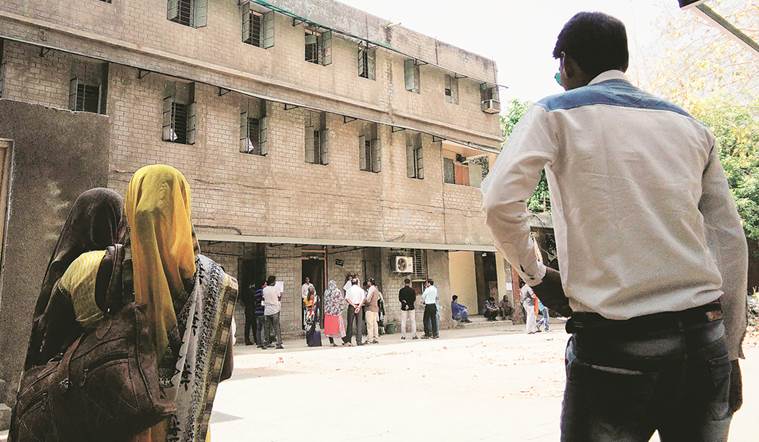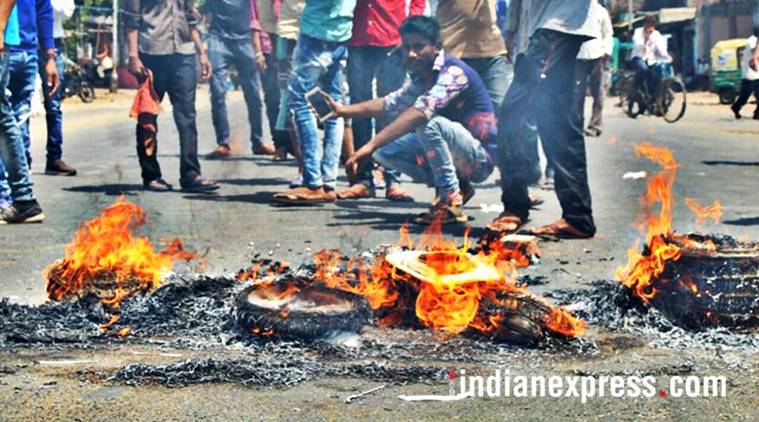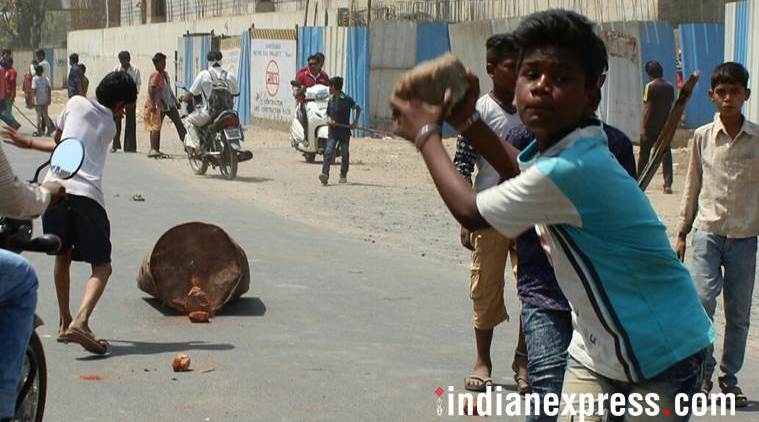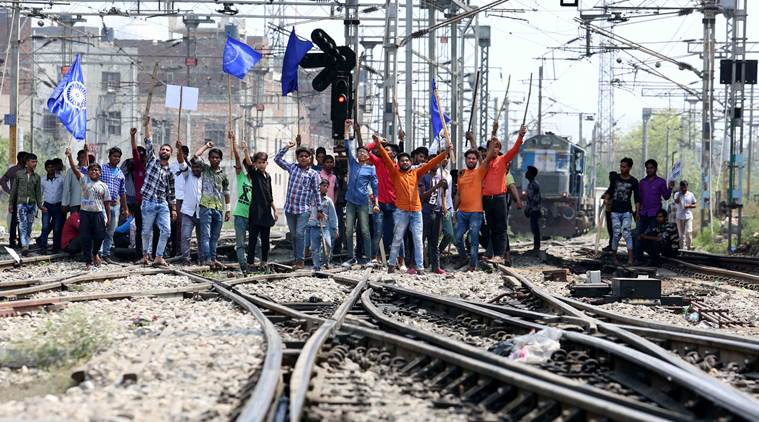 The father-in-law of a complainant, who was the last to secure a conviction from the SC/ST Special Court in Banda, breaks down and pleads for help, mistaking the Express team for officials. (Express Photo by Vishal Srivastav)
The father-in-law of a complainant, who was the last to secure a conviction from the SC/ST Special Court in Banda, breaks down and pleads for help, mistaking the Express team for officials. (Express Photo by Vishal Srivastav)
Over 1.44 lakh cases of atrocities against Scheduled Castes and 23,408 cases of atrocities against Scheduled Tribes came for trial before the judiciary in 2016, as per the last available data from the National Crime Records Bureau. Of this, only 10 per cent SC cases completed trial and later, just a fourth of this number ended in convictions. In case of STs, 12 per cent cases completed trial and a fifth of these ended in convictions.
The poor rate of convictions point to an unfinished agenda identified in the Scheduled Castes and the Scheduled Tribes (Prevention of Atrocities) Act – the law, commonly called the SC/ST Act, requires all states to provide for an ample number of Special Courts that can hear cases of atrocities against SC/STs. Yet, of the 700-odd districts in India, merely 194 districts across 14 states have set up such exclusive Special Courts; the rest have simply designated their existing overworked Sessions Courts as Special Courts.
READ | Rising pendency, falling convictions: what data on SC/ST Act trials show
Thus, almost 90 per cent of the cases filed under the SC/ST Act languish at the end of every year, and when they do manage to complete trial — on an average five years later — a majority of them end in acquittals.
Ramesh Nathan, general secretary of the advocacy group National Dalit Movement for Justice, says that most cases end in acquittals as prosecutors, often political appointees, don’t produce proper evidence. “They don’t brief the victims or the witnesses, who are also subjected to intimidation outside the court.”
Advocate Rahul Singh, who has handled several cases of atrocities, notes that a section of the SC/ST Act allows victims to choose a public prosecutor of their choice. “It’s a little-used section and is never implemented,” says Singh.
The poor implementation on ground has almost negated most of the gains made over the last century to safeguard the rights of Dalits and Adivasis, starting with the 1927 Mahad agitation led by Babasaheb Ambedkar. The agitation was held to protest ‘untouchables’ being denied access to public water tanks despite the Bombay legislature passing a resolution in 1923 stating that the depressed classes have equal rights to public places. In 1938, Madras Presidency enacted the Madras Removal of Civil Disabilities Act, which was followed by the Bombay Harijan Temple Entry Act, 1943.
Opinion | The SC order on Atrocities Act calls for a dispassionate discussion
These and the subsequent legislation in provinces and princely states were in response to individual fights to access public facilities, explains Sukhadeo Thorat, former director of the Indian Council for Social Science Research. Post-Independence, all legislation was replaced with the Untouchability (Offences) Act, 1955, that gave legal shape to Article 17 of the Constitution which abolishes the practice of untouchability. “In 1969, the historic Elayaperumal Committee recommended that the practice of untouchability is a violation of citizenship rights and based on that, the legislation was renamed as Protection of Civil Rights Act (PCR) in 1976,” observes Thorat.
 Dalit activists protesting during countrywide Bharat Bandh against the recent judgment by the Supreme Court on the SC & ST (Prevention) Atrocity Act 1989, in Ludhiana (Express photo by Gurmeet Singh.
Dalit activists protesting during countrywide Bharat Bandh against the recent judgment by the Supreme Court on the SC & ST (Prevention) Atrocity Act 1989, in Ludhiana (Express photo by Gurmeet Singh.
The PCR Act, however, failed to anticipate the response of the dominant caste to such assertion of rights. “Between 1955 and 1989, when the depressed classes tried to exert their rights provided under the law, the higher castes responded with violence. They would resort to everything from throwing excreta in their water bodies to burning their houses. Such atrocities were not imagined earlier and a need was felt for a special Act,” notes Thorat.
Former Government of India secretary P S Krishnan, chief advisor for the National Coalition for Strengthening the PoA Act and its Implementation, points out how, under pressure from Dalit MPs, the Union government started monitoring atrocities from 1974 onwards, and in the case of STs, from 1981 onwards. In 1987, during his Independence Day address, Prime Minister Rajiv Gandhi announced that an Act would be passed to check atrocities, and, in September 1989, Parliament passed the SCs and STs (Prevention of Atrocities) Act.
In 2015, under the NDA government, following sustained campaigning by Dalit rights organisations, 29 newer categories of offences were added to the Act to strengthen it further. These included, among others, forcing an SC or ST person into being a devdasi or manual scavenger, garlanding them with footwear and imposing social or economic boycott.
Krishnan who was instrumental in drafting the proposal for the Dalit groups in 2009, says the 2015 Act still fails to specifically address massacres and gangrapes. In the wake of the recent Supreme Court order, Krishnan wrote to the government citing several instances of mass killings of Dalits by caste Hindus in post-Independence India — from the Keezhvenmani massacre in Tamil Nadu in 1968 (where 44 people, 39 of them women and children, were killed by dominant caste landlords for demanding higher wages) to Kambalapalli carnage in Karnataka in 2000 (where seven Dalits were burnt alive) to six cases in Bihar, including the Laxmanpur Bathe carnage of 1997 where the Ranvir Sena gunned down 58 Dalits. In a majority of cases, the perpetrators were eventually acquitted by the higher courts.
Ahmedabad: ‘I didn’t know a person could even be convicted for atrocity’
 The Special Court to try cases under the SC/ST Act in Ahmedabad. Of 120 cases disposed of by it since Oct 2016, only 3 have since convictions. (Express Photo by Javed Raja)
The Special Court to try cases under the SC/ST Act in Ahmedabad. Of 120 cases disposed of by it since Oct 2016, only 3 have since convictions. (Express Photo by Javed Raja)
MANOJ Chavda, 42, stands in the dusty, wooden witness box that’s right at the entrance of the courtroom. The four ceiling fans and four wall fans drone on noisily, circulating the hot, humid air inside the courtroom and drowning Chavda’s voice.
Special public prosecutor Manisha S Sendar darts questions at him — “Were you there at the spot? Did you see the attack? Did you give a statement to the police?” — and keeps prodding him to speak louder. As he testifies in the court — one of 16 specially designated in Gujarat to try cases under the SC/ST Act, set up after the Una episode — Chavda looks composed, answering in the affirmative.
Chavda, a Dalit from Khokhra locality, is a witness in a July 2013 case in which his brother Chandrabadan, sister-in-law Renuka and nephew Akshay were allegedly beaten up by their upper-caste neighbours Dipak Nagraj, Madhvan, Santosh and one Selvi, in the Khokhra police station area of Ahmedabad. The accused are on bail and have been exempted from appearing in the court.
 Bharat bandh: Violent protests were reported in Gujarat during the nationwide stir earlier in the week. (Express Photo by Javed Raja)
Bharat bandh: Violent protests were reported in Gujarat during the nationwide stir earlier in the week. (Express Photo by Javed Raja)
While the Chavdas have alleged that they were beaten up for busting an illicit liquor trade run by the accused, and that while doing so, they also hurled casteist remarks, the defence has been saying that Chavda molested a girl and that his family was beaten up by a mob, not by the accused. Outside the courtroom that’s in the precincts of the 600-year-old Bhadra Fort, a few people mill around, mostly youngsters with plastic bags filled with their case documents.
Entry to the building is through a Mughal-era gate called Jail Haveli. Across the road, construction is on in a new multi-storied building that is expected to house over two dozen city civil and sessions courts, including this one.
The Gujarat government set up this Special Court, along with the 15 others, in October 2016, after the uproar over Una, where four Dalit men were publicly flogged on July 11, 2016, for skinning dead cattle. Ahmedabad has two such courts, one that caters to Ahmedabad City and the other for Ahmedabad Rural.
Sendar, the special public prosecutor, says most of the cases that come to this Special Court (for Ahmedabad City) are of “voluntarily causing hurt, hurting with dangerous weapons and threatening life”. “When this Special Court (for Ahmedabad City) became functional in October 2016, 250 cases were transferred here, of which 120 have been disposed of so far,” she says, adding, “But of the 120 cases, there have been convictions in only three. This was the first Special Court, of the 16 that were set up after Una, to pass a conviction order under the SC/ST Act.”
 According to data with the SC/ST cell of the state police, in 2016, the year of Una, the conviction rate in the state under the Act was 8.52 per cent, the highest since 2012. (Express Photo by Javed Raja)
According to data with the SC/ST cell of the state police, in 2016, the year of Una, the conviction rate in the state under the Act was 8.52 per cent, the highest since 2012. (Express Photo by Javed Raja)
While laying down stringent safeguards, including provisions for anticipatory bail and a “preliminary enquiry” before registering a case under the SC/ST Act, the Supreme Court had on March 20 referred to the National Crime Records Bureau data for 2015, which said over 75 per cent of cases under the Act taken up by the courts had resulted in acquittals/withdrawal or compounding of the cases.
The reason behind the low conviction rate, says Sendar, is that the accused, who are usually socially dominant by virtue of being upper castes, reach a “compromise” with the victims. “We don’t come to know about the compromise initially, but then witnesses start turning hostile and we realise the case will collapse. This is what leads to acquittals in most cases,” she says.
According to data with the SC/ST cell of the state police, in 2016, the year of Una, the conviction rate in the state under the Act was 8.52 per cent, the highest since 2012. In 2016, 62 cases led to convictions while 734 led to acquittals. Just a year later, in 2017, the conviction dropped to a five-year low of 2.33 per cent, with 1,972 cases resulting in acquittals. This year, till February, the prosecution has failed to prove charges in 161 cases.
So far, the Special Court in Ahmedabad has seen three convictions, of which the first was in April 2017, months after the Una flogging case. While holding accused Nitesh M Rajput guilty of murder and under charges of atrocity, the court had awarded him life imprisonment. Rajput had in 2013 allegedly stabbed Minaben Parmar, a Dalit woman, in Meghaninagar police station area of Ahmedabad district.
“I had never known that a person could be convicted for atrocity. I saw this in my mother’s case,” says Minaben’s son Vipul Parmar, a technician who lives in the Chandkheda area of Ahmedabad. Parmar says that after his mother’s murder, the family of the accused tried both threats and inducements to get him to settle the case, forcing him to shift from his ancestral home at Meghaninagar to Chandkheda, where he now lives on rent.
He says the trial started a year and a half after the incident, but picked pace only after the Special Court was set up in 2016. “I don’t know if the murderer is still in jail or out on bail, but from my experience in this case, I can tell you that more than courts, we need good and sensitive policemen. Courts rely on the investigation papers and nothing else,” he says.
Dalit activist Valjibhai Patel agrees, saying, “A number of cases end in acquittals because of police negligence. Usually, the probe is conducted by a sub-inspector or an inspector-rank officer, though the SC/ST Act says an officer of the rank of deputy superintendent should probe cases.”
He says there are other reasons for the dismal conviction in atrocity cases. “The complainants are mostly poor people who are not guided by public prosecutors. Most victims can’t differentiate between the public prosecutor and defence lawyer,” he says.
Back in the courtroom, defence lawyer S M Pathan begins cross-examining Chavda. Pathan points to the address recorded by the police in Chavda’s statement and asks him if it is correct. “No,” replies Chavda. “So do you think the police wrote your statement on their own, just like they wrote your address?”
At this, Chavda’s brother Chandrabadan gets agitated, threatens Pathan and walks out of the courtroom. Pathan urges the court to take note of Chandrabadan’s behaviour. The trial proceeds and Pathan continues cross-examining Chavda, alleging that he was harassing a girl in the neighbourhood. “Manojbhai, the girl’s parents didn’t lodge an FIR since you threatened to book them in an atrocity case.”
Chavda calmly says, “You are free to say whatever you want but this is not true.” Special Judge D J Shah looks up from his desk to announce that the trial has been adjourned and announces the next date of hearing: May 5. “Bring two witnesses for it,” the judge adds, getting up to leave.
Banda, UP: ‘We don’t even have enough to eat and now, all these cases. Please free us’
 Dalit Activists protesting on the Railway tracks in Ludhiana on Monday during countrywide Bharat Bandh against the recent judgment by the Supreme Court on the SC & ST (Prevention) Atrocity Act 1989. (EXPRESS PHOTO BY Gurmeet Singh)
Dalit Activists protesting on the Railway tracks in Ludhiana on Monday during countrywide Bharat Bandh against the recent judgment by the Supreme Court on the SC & ST (Prevention) Atrocity Act 1989. (EXPRESS PHOTO BY Gurmeet Singh)
In his torn, brown shoes caked with mud, Lallu Ram, a daily-wage labourer from Kaiyal village, has travelled about 40 km to reach the district court in Banda. The 27-year-old is a complainant in a five-year-old case of atrocity filed under the SC/ST Act.
Ram alleges that while he and his sister were on their way back from her in-law’s house in another village, they were beaten up “without any reason” by Mauryas (an OBC caste) from his village. He does not know much about the progress of his case, except that there is a hearing today.
“They beat us up. When we registered a case, SC/ST sections were included. It has been about five years. Vakeel ne kaha ana hai to majuri chod ke aye rehe hain (The lawyer told me to come, so I left my day’s work and came here),” he says.
Lallu Ram suddenly freezes on seeing a group of men. He turns his back towards them and indicates they are the accused in the case — Dangal Maurya and his brother-in-law Mahesh Maurya. Mahesh later says the “actual dispute” was over a piece of land on lease with Dangal’s family. “Lallu Ram alleged that we had beaten and looted them in broad daylight. But they are doing this over a piece of land and we are sure that justice will be served,” says Mahesh, adding, “We are not very rich either.”
Lallu Ram’s is one of over 1,200 cases that are pending in the Banda Special Court, which occupies a room in the district court building. The court, which was established under the SC/ST Act about 15 years ago, takes up about 30 cases a day, most of them “minor offences” such as use of abusive language, caste slurs, minor scuffles and assault.
According to police records of 2014, at 46.91, Banda had the highest rate of crimes reported under the Act in UP against the SC/ST population in the district. Pratapgarh, Bareilly and Bahraich followed Banda on that list.
Banda District Government Counsel Uma Shankar Patel admits cases have been piling up in the district’s SC/ST Special Court, with some pending for over 10 years, for reasons such as witnesses not appearing to record their statements.
Assistant District Government Counsel Ashutosh Mishra says a shortage of staff has stretched the court’s already strained resources. “There is just one special SC/ST court in Banda. There are 14 posts of assistant district government counsel in Banda, but there are only three of us. So not only do I appear at the SC/ST Special Court, but in other courts too,” he says, adding that the SC/ST Special Court also hears cases registered under the Motor Vehicles Act and the Essential Commodities Act.
The last conviction under the SC/ST Act in the Banda Special Court happened in September 2017. The court had sentenced Kailash Singh of Sarda village in the district to six months of rigorous imprisonment and imposed a fine of
Rs 1,000 for attacking a Dalit woman from the same village in 2009. Singh had been charged under IPC Section 354 (assault or criminal force of woman with intent to outrage her modesty), among others. About 67 km from Banda town is Sarda, a village set in the rocky mountains of Kalinjar.
Working in his field, the sun beating down on him, the 86-year-old father-in-law of the woman who had filed the harassment case against upper-caste men of the village, says his daughter-in-law and son, the younger of his two sons, no longer live there. They moved to Punab and then Allahabad to work as daily wagers.
But the other side, he says, filed counter-charges of assault against his son. “They told him there was a warrant against him, so he came here and they arrested him,” he says, sinking to his knees and pleading for help. “Life has been tough since we filed the case against the Thakurs,” he says, adding, “Yahan khane ko to theek hai nahin, upar se yeh vakeel, mukadma. Humar logan ke bas ki baat nahin, padhe likhe hain nahin… Jo kehta hai kar dete hain (We don’t even have enough to eat and now, all these cases. We aren’t educated; we do whatever we are told to),” he says, hands folded and tears rolling down his cheeks. “Humein isse mukti dila do (Please free us from all these cases),” he cries.